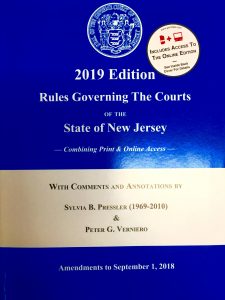The rumor is we did have a summer this year. Besides what seemed like a few nice days, what passed for summer flew by like a flash. Suddenly it was Labor Day, which for most people signals the arrival of Fall. What else arrives each Fall? The annual Amendments that have been approved by our Supreme Court to the Rules Governing the Courts of the State of New Jersey arrive. Historically, any significant changes in the Part V Rules affecting Family Part practice are made every other year. This was an off-cycle year, meaning there was a paucity of amendments to the Family Part Rules this year. However, there were a number of Rule amendments in other sections of the Rules that either have a direct impact upon Family Part practice in some fashion, or may have some general application to aspects of this practice. I will summarize and discuss these Amendments over the course of several blog posts.
arrival of Fall. What else arrives each Fall? The annual Amendments that have been approved by our Supreme Court to the Rules Governing the Courts of the State of New Jersey arrive. Historically, any significant changes in the Part V Rules affecting Family Part practice are made every other year. This was an off-cycle year, meaning there was a paucity of amendments to the Family Part Rules this year. However, there were a number of Rule amendments in other sections of the Rules that either have a direct impact upon Family Part practice in some fashion, or may have some general application to aspects of this practice. I will summarize and discuss these Amendments over the course of several blog posts.
Besides an addition to Rule 5:22 involving juvenile matters, the only actual Amendment in Part V dealing with Family Part Practice is in regards to Rule5:1-2. Rule 5:1-2(a) generally defines what types of “Family Actions” are to be filed and heard in the Chancery Division, Family Part. The prior version of this Rule, after delineating certain specific types of actions, included not once but twice catch-all language to include “all civil actions in which the principal claim”, as well as “all other civil actions and proceedings” which were “unique to and arising out of a family or family-type relationship”. Very broad language indeed. While the recent Amendments to this Rule may seem subtle, they represent an attempt to better define what types of Family Actions are cognizable in the Family Part. While continuing to include reference “all actions in which the principal claim is unique to and arises out of a family or family-type relationship”, the recent Amendment deleted reference to the term “civil” actions, and deleted the catch-all “all other civil actions and proceedings” language at the conclusion of the Rule. Palimony actions were added to those which should be filed and heard in the Family Part. Most importantly while the amended rule continues to include reference that “such action shall include all actions and proceedings referenced in Chapters II and III of Part V”, the language “unless otherwise provided in Rule 4:3-1(a)(4)” was added. What does this mean? This language was added for the purpose of cross-referencing those actions excepted from Family Part jurisdiction in light of the contemporaneous adoption of Rule 4:3-1(a)(4).
Please remember that the Part IV Rules are intended to govern Civil Actions generally, and which includes most Family Actions unless otherwise specifically addressed in the Part V Rules. Before turning our attention to Rule 4:3-1(a)(4), Rule 4:3-1(a) delineates generally which Court or Division a certain type of action should be instituted. Rule 4:3-1(a)(3) delineated the types of actions which were to be instituted in the Chancery Division, Family Part. However, it is curious to note that the language of this Rule was also subtlety amended to track some of the language changes to Rule 5:1-2(a), i.e. deleting the reference to “civil” and adding a reference to palimony actions, yet curiously continued to include the catch-all “all other actions and proceedings unique to and arising out of a family or family-type relationship” although deleted from Rule 5:1-2. What this means or whether it was an oversight or intentional is unclear. However, the language of the Rule referencing actions cognizable in the Family Part to “include all actions and proceedings referenced in Part V of these rules” is now followed by the limiting language “unless otherwise provided in sub-paragraphs (a)(4) of this rule”, referring in this instance to the newly enacted Rule 4:3-1(a)(4). This new rule sub-paragraph specifically refers to variety of actions named therein which may be associated with Family Actions, but which constitute exceptions from the normal Family Part practice. Said another way, while they may generally arise out of a family or family-type relationship, Rule 4:3-1(a)(4) attempts to delineate which Division or Part certain types of actions should be filed and heard, and not necessarily in the Family Part. Rule 4:3-1(a)(4) identifies nine (9) such types of actions. I will briefly comment on each of them.
 New Jersey Divorce and Family Lawyer Blog
New Jersey Divorce and Family Lawyer Blog


